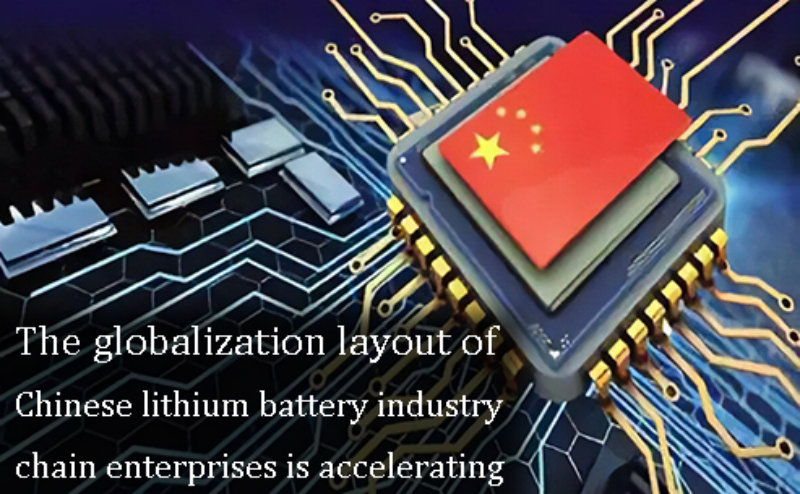
Main content:
- The European power battery industry accelerates its rise
- Signals released by actions in equipment procurement and battery production delivery
- The capacity construction of European local start-up battery companies accelerates
- Chinese lithium battery equipment companies accelerate their entry into the international market
- Chinese lithium battery equipment companies face challenges in global market expansion
- A number of Chinese lithium battery industry chain companies are competing to list in Europe
- GOTION HIGH-TECH has initially launched a global layout
- GEM expands the international market actively
- Shanshan Corporation accelerates international business development
- KEDA intends to support the international development of its business by issuing GDR
- China's policy promotes lithium battery industry chain companies to go public globally
1.The European power battery industry accelerates its rise
The accelerated rise of the European power battery industry is opening up new market growth space for Chinese lithium battery equipment companies. It is reported that a number of Chinese lithium battery equipment companies, including LEAD INTELLIGENT, YINGHE TECHNOLOGY, and HYNN TECHNOLOGIES, have recently obtained purchase orders from the French start-up battery company Automotive Cells Company (ACC), which will provide lithium battery production equipment for its 13GWh super battery factory in France. These lithium-ion battery production equipment will be used to produce the best lithium batteries to meet the strong demand for power lithium batteries.
ACC was established in June 2020, mainly engaged in the development and production of electric vehicle battery cells and modules It is jointly operated by Stellantis, Saft, a subsidiary of TotalEnergies, and Mercedes-Benz, with support from French, German and European authorities. ACC plans to build three factories with a production capacity of 40GWh in Germany, France and Italy respectively. The total power battery capacity will reach 120GWh in 2030, and it will continue to develop and produce next-generation high-performance batteries.
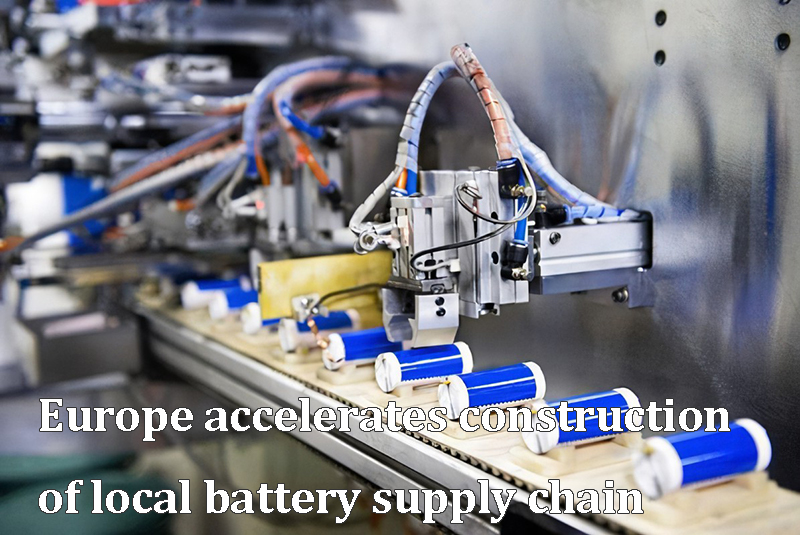
As one of the representatives of local power battery companies in Europe, ACC purchased production equipment from a number of Chinese equipment companies at the same time, indicating that its power battery capacity construction will enter a new stage, and it is expected that new lithium battery equipment orders will be placed in the later stage. In addition, Swedish battery manufacturer Northvolt recently announced the start of shipments, becoming the first European battery company to supply power batteries to European OEMs.
Chinese lithium battery equipment companies, including LEAD INTELLIGENT, also provide production equipment for their factories. Behind Northvolt and ACC's increased investment and orders in equipment, lithium battery raw materials and recycling, the EU is accelerating the construction of local power battery supply chain, which also provides good development opportunities for excellent Chinese lithium equipment enterprises with global sales strength.
2.Signals released by actions in equipment procurement and battery production delivery
Overall, the actions of the above-mentioned battery companies in equipment procurement and battery production and delivery have released several major signals:
① The capacity construction of European local start-up battery companies accelerates
Europe has accelerated the construction of a local battery supply chain, and the capacity building of local start-up battery companies has accelerated, releasing huge demand for procurement. In fact, in addition to ACC and Northvolt, other European battery companies, including Sweden's Northvolt, France's Verkor, Britain's Britishvolt, Norway's Freyr, Norway's Morrow, Italy's Italvolt, and Serbia's ElevenEs, are also accelerating their power battery capacity construction.
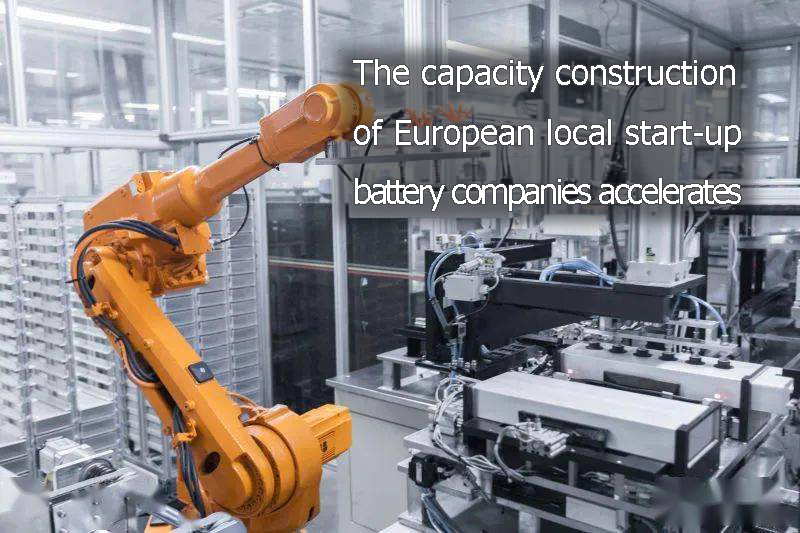
A report released in June 2021 by the European Union NGO Transport and Environment Federation shows that the total number of super factories that have been built or are under construction in existing projects in Europe has reached 38, with an estimated total annual output of 1,000GWh. The demand will exceed 300 billion RMB (calculated by 1GWh corresponding to the equipment investment of 300 million RMB). Coupled with the power battery capacity deployed in Europe by Chinese and Korean battery companies such as LG Chem, Samsung SDI, SK on, CATL, GOTION HIGH-TECH, SVOLT, FARASIS, etc. It is expected that the market demand for lithium battery equipment in Europe will further increase by 2030.
② Chinese lithium battery equipment companies accelerate their entry into the international market
Chinese lithium battery equipment companies have accelerated their efforts to sell all over the world, the performance of Chinese equipment has been recognized by international battery companies, and global orders have entered a period of growth. Currently, Europe is accelerating the construction of local power battery production capacity, but the weak local supply chain has become the biggest obstacle to the rise of the European power battery industry. Under this circumstance, a group of Chinese lithium battery equipment companies with the ability to go global have obtained good development opportunities and become an important force in the construction of the supply chain of European battery companies.
On the one hand, after years of development, the performance of China's lithium battery equipment is not inferior to that imported from Japan and South Korea, and it is even in a leading position in some fields. China's power battery manufacturing has currently achieved large-scale substitution of imports and began to export, laying the foundation for Chinese equipment to enter the supply chain of European and American battery companies and OEMs. On the other hand, the new infrastructure for power batteries in Europe will put forward requirements for efficient and stable production and delivery in the field of lithium battery equipment.
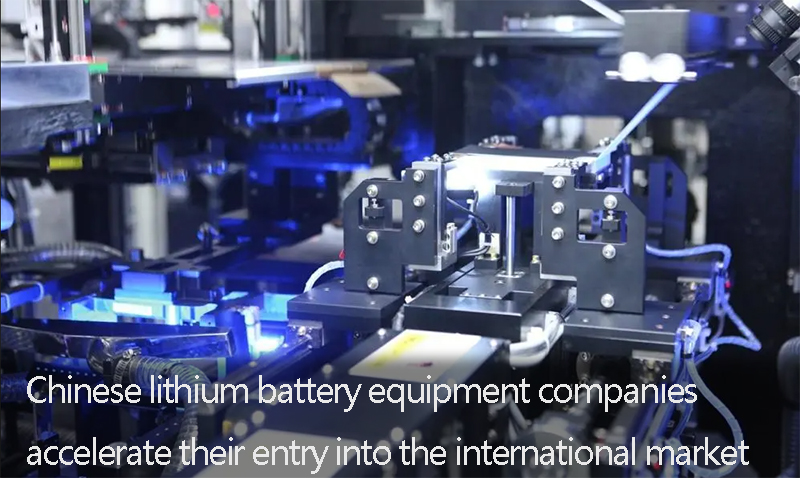
Compared with Japanese and Korean companies, China's leading lithium battery equipment companies currently have faster and more stable delivery capabilities, which will become an important choice for European battery companies to speed up the release of production capacity. Among them, European battery companies including Northvolt, ACC and other European battery companies have purchased Chinese lithium battery equipment on a large scale, indicating that the performance of Chinese equipment has been recognized by them.
It provides favorable conditions for Chinese lithium battery equipment to enter the European supply chain, and is expected to drive other European battery companies to reach cooperation with Chinese lithium battery equipment companies. In addition, Chinese battery companies, including CATL, SVOLT, FARASIS, and CALB, have established factories in Europe, and also require their equipment suppliers to supply their global factories and provide nearby supporting services, thereby driving Chinese lithium battery equipment companies from Products, technologies, services, supply chains and other aspects of the global layout, deeply involved in the European supply chain competition.
At present, a number of equipment companies, including Lyric Robot, Hymson, LEAD INTELLIGENT, KATOP, UNITED WINNERS, YINGHE TECHNOLOGY, HYNN TECHNOLOGIES, and NAKNOR, have entered the ranks of international car companies/power battery companies. supply chain. It is expected that more Chinese equipment companies will enter the international market later. With the acceleration of battery capacity construction in Europe, the global orders of the above equipment companies have entered a period of rapid growth, which will further enhance the international competitiveness of Chinese equipment.
3.Chinese lithium battery equipment companies face challenges in global market expansion
It is worth noting that although Chinese lithium battery equipment companies have been recognized by European battery companies with their competitive advantages in technology, products and supply chains, they also face multiple pressures and challenges. The implementation of EU carbon tariffs and the revision of the "New EU Battery Regulations" mean that Europe will have stricter control over the local power battery industry chain.
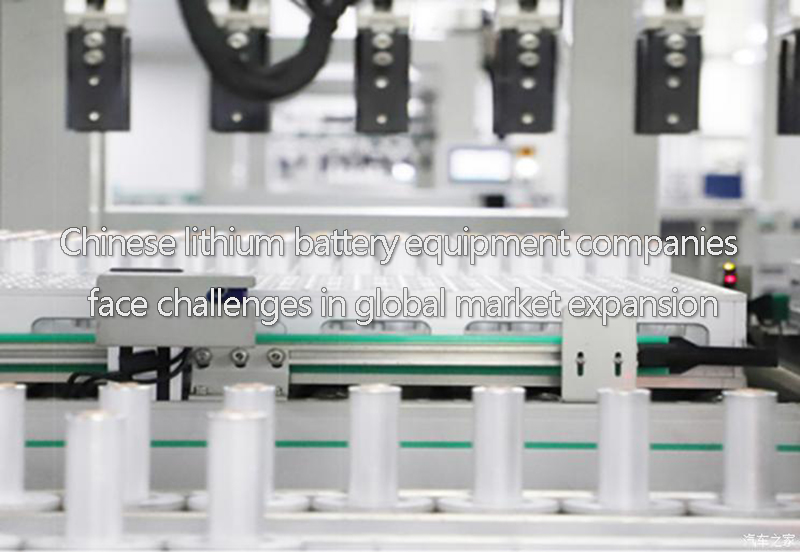
The zero carbonization of the European battery industry chain will put forward stricter requirements for Chinese lithium battery equipment companies in terms of technical indicators, quality control, performance and regulatory certification. At the same time, if Chinese lithium battery equipment companies want to deeply participate in the European market, they must deeply understand the manufacturing process and technical route of European battery companies, establish an international R&D and service team to meet the requirements of European customers, and comprehensively enhance the company's international competitiveness.
In addition to high investment costs, how to deal with the political environment, emission regulations, infrastructure requirements, industrial chain, patent disputes, corporate culture, talent management and customer requirements in Europe are all new propositions for Chinese lithium equipment enterprises going global. Under this circumstance, Chinese lithium battery equipment companies must have core competitiveness in terms of technology, products, scale, cost-effectiveness, capital and other hard power, and make long-term strategic plans.
4.A number of Chinese lithium battery industry chain companies are competing to list in Europe
In addition, the global electric vehicle industry demand has exploded, the global market expansion of Chinese lithium battery industry chain companies has accelerated, and many companies have also made substantial progress in global financing matters. Recently, GEM disclosed that the China Securities Regulatory Commission reviewed the application materials submitted by the company regarding the company's proposed issuance of Global Depository Receipts ("GDR") and listing on the SIX Swiss Exchange.
One of the mechanisms for the administrative license to interconnect the depository receipts. The interconnection depository receipt mechanism means that eligible companies listed in the two places, in accordance with the laws and regulations of the other side's market, issue depository receipts and list and trade on the other side's market. In other words, global listing applications are accepted. Global depository Receipts (GDRS) are one of the interconnected depository Receipts (GDRS).
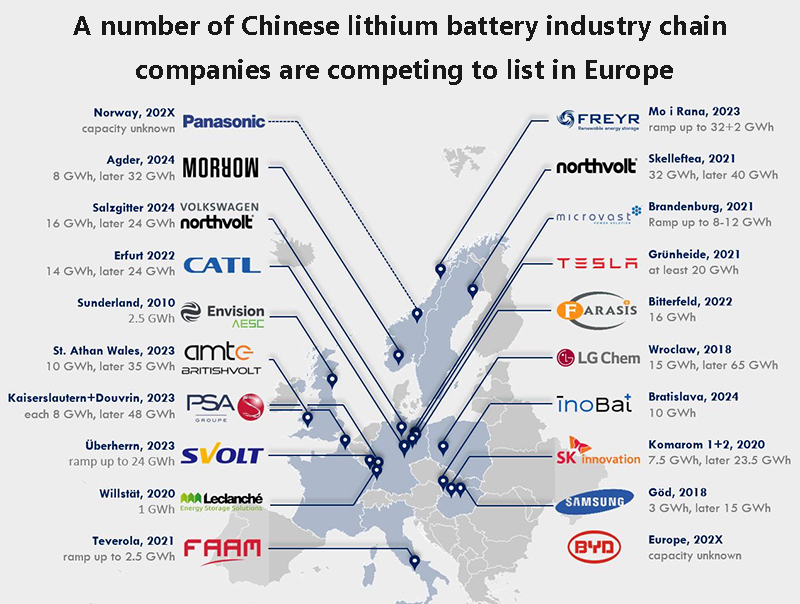
The Interconnected Depository Receipts (GDRS) mechanism refers to the issuance and trading of GDRS by qualified dual-listed companies in accordance with the laws and regulations of the other market. In other words, an overseas listing. It is worth noting that in addition to GEM, there are also battery and lithium battery industry chain companies such as GOTION HIGH-TECH, Shanshan Corporation and KEDA. They have also announced plans to issue GDRs and list them on the Swiss Stock Exchange and all want to seize the opportunity to take the lead in issuing GDRs globally.
For the above-mentioned companies, there are multiple considerations for choosing to list globally. In the past two years, the global electric vehicle sales have grown rapidly, and will double year-on-year in 2021. The prosperity has accelerated, driving the resonance of the entire industry From the perspective of the global market, European car companies such as Volkswagen, BMW, Mercedes-Benz, Stellantis, Renault, and Daimler are accelerating their electrification transformation.
And North American car companies represented by Tesla, GM, and Ford also continue to have strong demand for power lithium batteries, and the huge battery industry chain supporting demand is about to explode. In terms of battery companies, many local battery companies have emerged in Europe, such as Sweden's Northvolt, France's ACC and Verkor, Britain's Britishvolt, Norway's Freyr and Morrow, Italy's Italvolt, and Serbia's ElevenEs.
The United States is also actively promoting localized production of battery companies. Markets such as Europe and the United States will become an important incremental market for electric vehicles in the world, and the demand for power batteries and upstream raw materials and equipment will increase significantly in the future. Based on this judgment, Chinese power battery and upstream raw material and equipment companies are making full preparations to actively go globally.
① GOTION HIGH-TECH has initially launched a global layout
As one of the leading power battery companies, GOTION HIGH-TECH's global layout has been initially launched.In terms of global orders, GOTION HIGH-TECH has reached strategic cooperation with a number of international customers and signed product purchase and sales orders, only its wholly-owned global subsidiary GOTION, INC. It is expected that between 2023 and 2028, it will supply no less than 200GWh of batteries to major US listed car companies。
In terms of building an industrial system, in 2021, GOTION HIGH-TECH announced that it will cooperate with Volkswagen Aktiengesellschaft to jointly build a full life cycle industrial chain in Europe from battery materials, battery products to battery recycling. It also plans to acquire the Bosch Group's plant in Göttingen, Germany, to establish its first new energy production operation in Europe. Its wholly-owned subsidiary Hefei GOTION HIGH-TECH and Tata plan to establish a joint venture in India.
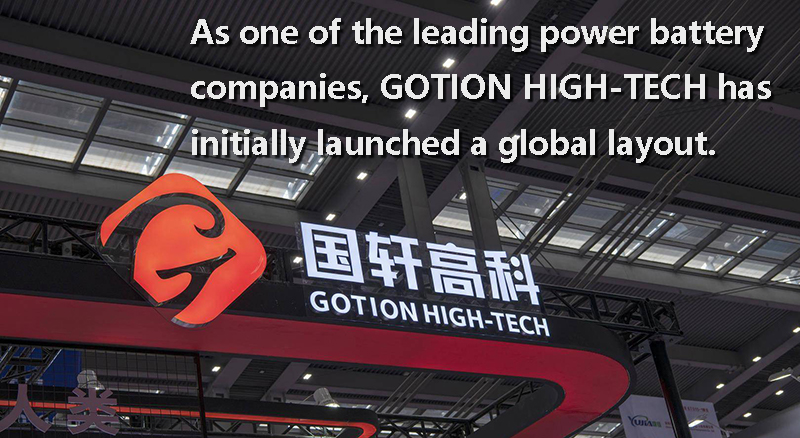
In general, GOTION HIGH-TECH plans to increase power battery capacity construction and supporting industry construction in global markets such as Europe, North America, and Asia in the future, aiming to accelerate the realization of its global market layout. The secretary of the chairman of GOTION HIGH-TECH stated that the global listing is expected to enhance the company's global reputation and promote international development.
"We already have many global customers, and we are still expanding new global customers. Global customers have a very real demand, that is, we need to build joint ventures around the world. All these require money, and the most effective way is through the global capital market. Financing, which is conducive to accelerating our global market layout, and at the same time attracting more outstanding global R&D and management personnel to accelerate the pace of global layout." It further shows that the global issuance of GDRs meets the actual needs of enterprises at the current price segment.
② GEM expands the international market actively
As one of the leading companies in the field of lithium battery resource recycling, GEM has also shown enthusiasm for global expansion in terms of resource layout, customer cooperation and industrial system construction. As early as 2018, GEM signed the "Joint venture Agreement on the Construction of Indonesian lateriite nickel mine for the production of battery-grade Nickel Chemicals (Nickel sulfate crystal) (50,000 tons of nickel per year)" with TSINGSHAN, BRUNP, IMIP, and Hanwa, achieving the resource layout in line with international standards.
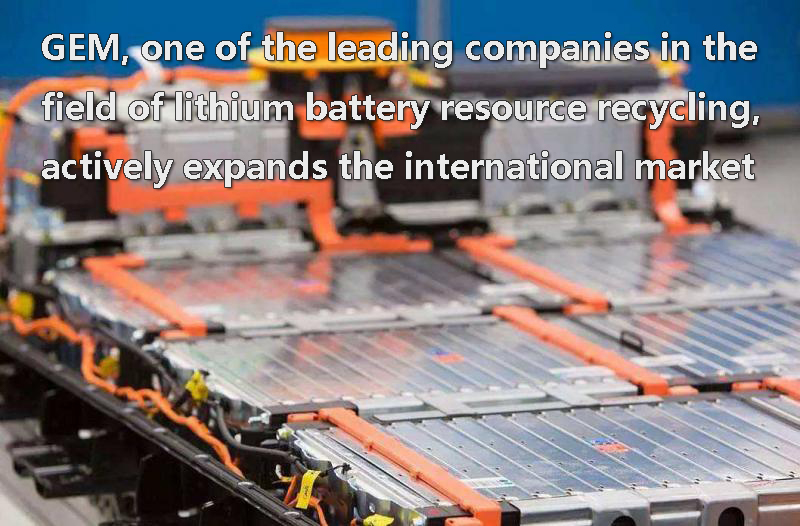
GEM has reached cooperation with global companies such as Samsung SDI, ECOPRO, LGC, BASF, etc. at present, and its customer structure has become internationalized. The 20,000-ton waste battery processing production line of its Posco power battery recycling base in South Korea has been completed and put into operation in 2021. In addition, it recently stated that it will invest in the production of high-nickel precursors and the recycling and recovery of end-of-life power batteries in Hungary to build a European factory.
GEM's path to building a global power battery recycling industry system is gradually clear. The deputy general manager of GEM pointed out, "The global issuance of GDR is very important for the company to expand international financing channels, meet the company's international business development needs, further strengthen the company's global brand influence and promote internationalization strategies."
③ Shanshan Corporation accelerates international business development
Shanshan Corporation, as a comprehensive material supplier of lithium batteries for cathodes, anodes and electrolytes, has also taken steps in its global layout.In terms of cathode materials business, it joined hands with BASF to establish a joint venture in August last year, and transferred 19.6438% of its cathode business subsidiary Shanshan Energy to BASF to accelerate international business expansion. Shanshan said that through the global issuance and listing of GDRs, it hopes to directly connect with the global capital market, enhance brand awareness and influence, and optimize the shareholding structure.
④ KEDA intends to support the international development of its business by issuing GDR
KEDA entered the field of lithium battery anode materials in 2015. At present, it has formed "50,000 tons/year of forged coke-30,000 tons/year graphitization-10,000 tons/year artificial graphite-1000 tons/year silicon carbon negative electrode" graphite Integrated production capacity structure. In addition, by holding 43.58% of the shares of LAKELITHIUM, it has deployed the field of salt lake lithium extraction and carried out lithium carbonate deep processing and other businesses.

In 2021, LAKELITHIUM's lithium carbonate production and sales will be 22,700 and 19,200 tons respectively. Industry insiders believe that KEDA plans to plan a global listing by issuing GDRs, which will provide support for the international development of its main business. KEDA said that the funds raised will be mainly used to expand its main business and strategic investment business, promote its global layout and supplement the company's operating funds.
In fact, in order to realize the globalization strategy, the global issuance of GDRs is beneficial to enterprises. It is understood that the main purposes of the above four Chinese companies planning to issue GDRs globally include: 1.Unblock global financing channels and use capital market support to meet corporate business development capital needs; 2.Introduce global professional investment institutions and industrial investors to optimize shareholder structure; 3.Build a global market system to enhance global competitiveness; 4.Participation in the global industrial chain; 5.Improve corporate governance; attract international talents, etc.
5.China's policy promotes lithium battery industry chain companies to go public globally
In fact, this round of lithium battery industry chain companies competing to go public globally is also closely related to China's recent care policy. On February 11, the Chinese government issued relevant regulations. Eligible listed companies in Shanghai and Shenzhen can participate, and the listing destinations can be selected from the United Kingdom, Switzerland and Germany, opening up new financing channels.
Subsequently, the meeting held by the Chinese government on March 16 also proposed that the Chinese government will continue to support various companies to go public globally. On the same day, the Chinese government also stated that it will step up efforts to promote the implementation of the new regulations on the global listing of enterprises, support all kinds of qualified companies to go public globally, and maintain smooth global listing channels.
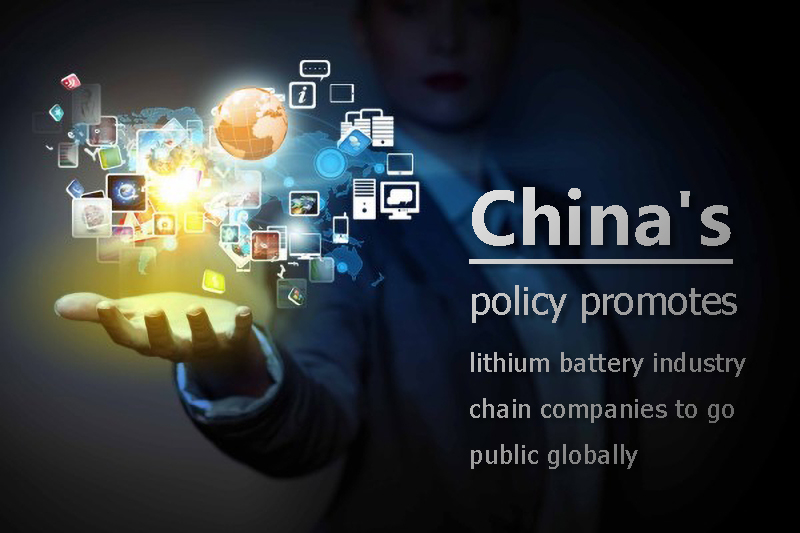
On the whole, among the 8 Chinese A-share companies that are promoting the global issuance and listing of GDRs, the lithium battery industry chain companies are particularly active. Judging from the progress, the application for the proposed issuance of GDR by KEDA and GEM has been accepted by the China government, and the proposals related to the proposed issuance of GDR by GOTION HIGH-TECH and Shanshan Corporation.
At present, many Chinese lithium battery industry chain enterprises such as CATL, GOTION HIGH-TECH, Envision, EVE, SVOLT, FARASIS, EASPRING, CAPCHEM, and KDL are accelerating the pace of global factory construction, providing supporting facilities for customers around the world, most of which are in Top 15 power battery companies. At the same time, they will build a global market system to further enhance global competitiveness. Driven by the market and supported by policies, more companies may choose to go public globally.
















